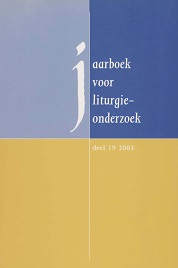Liturgische en hagiografische anamnesis in de vroege Middeleeuwen
Abstract
The concept of anamnesis has always played an important role in liturgical studies. Although contemporary liturgists pay attention to tills core concept of Christian liturgy (most notably LUKKEN: Rituelen in overvloed 1999), there is little attention for a detailed study of the ‘object’ of anamnesis. Examination of a couple of eucharistic prayers for holy days of saints from the earlymedieval Gallican liturgy in relation to hagiographic texts from the period provides us with two remarkable findings. In the first place, the saint turns out to play a central role in the eucharistic prayer of the Gallican rite. In the immolatio or contestation comparable to the Roman preface, the holy deeds of the saint (virtutes sancti) are the centre of attention. Hagiographic texts, such as the writings of Gregory of Tours, tell us that cures and other miracles took place particularly during this part of the eucharistic prayer. This phenomenon is in accordance with the process visible in early medieval Gaul where, by the ‘deification’ of Christ, the need for a near human mediator increased. In the second place, the material gives rise to the conclusion that the power of anamnesis is found not only in liturgical texts. In a recent study by Claudia Rapp of Greek hagiographic texts of the fifth century, the reading aloud in the community of texts in which the life and deeds of the holy person are recounted, is presented as a process that resembles the anamneric working of the eucharistic prayer. In the retelling, hearing and appropriation of the stories about the holy person, the virtutes sancti become concrete in the here and now. Thus, hagiography has an important anamneric function. By telling the stories about the saints again and again, these stories become reality again and again, and create, just as when the saint still lived or was still physically present in the community, future for those who hear and experience the stories. It is this anamnetic aspect that makes hagiography an essentially liturgical act.


